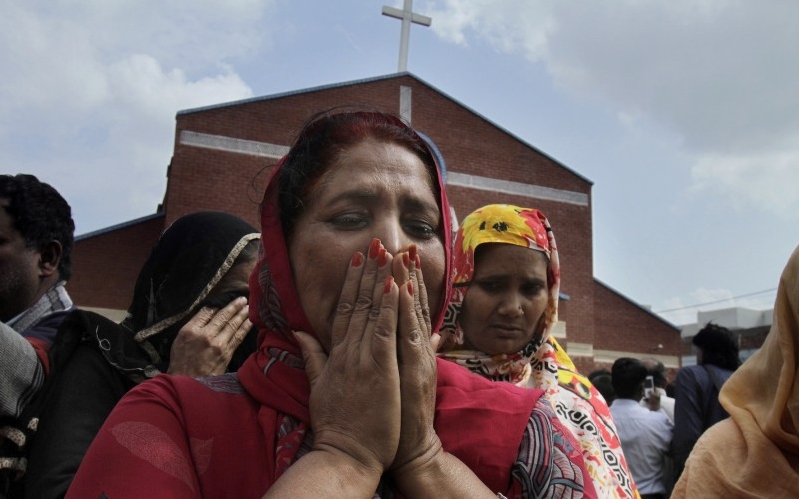
A mob of drunken Muslims stormed the homes of Christians in Pakistan, beating men, women and children they deemed to be "ritually impure" and insulting the name of Jesus Christ.
According to a report from the London-based charity British Pakistani Christian Association, a group of Muslim men in the Faisalabad district physically beat at least seven Christians in the town of Samundri last Friday.
The men were extremely boisterous and loud in their drunken stupor, according to BPCA, prompting one of the women from a Christian home to ask them to move somewhere else as they were disturbing the peace.
However, the Muslim men responded in anger, infuriated that the "ritually impure" Christians were making demands on them. They reportedly gathered any fighting implements they could find, including sticks and metal rods, and returned in a mob of between 35 - 40 people. The mob entered the homes of the Christians and began beating men, women and children while shouting obscenities.
They also insulted Jesus Christ, even though He is also a prophet in the Quran. Seven victims were injured in the attack, five of whom had to go to the hospital to receive treatment for their injuries.
"I had returned from work and we were enjoying some rest as we waited for our food to be prepared. A group of drunk Muslims came and were shouting loudly and saying lewd things to any young girls that were passing," Arif Masih told BPCA officer Kanwal Amar, who visited with the victims in the hospital and at their homes to provide counseling and support.
"My wife asked them to leave the area as they were disturbing locals and they started shouting obscenities at us, but left shortly after," Masih continued. "About and hour later they returned with a gang of around 15 people and started beating us with sticks and poles. They said all Christians should be killed. They said we were evil demons and made Pakistan impure. I thought I and my family would be killed. It was very frightening."
When Amar first arrived, he noticed that no report had been filed by police despite the obvious destruction. He later visited the police station in Samundri with a couple local village leaders to urge police to seek justice for the Christians, eventually convincing Deputy Superintendent Malik Shahid to register a police report.
"To many, this attack just seems to be an act of drunken violence. But the manner of the insults directed at these innocent Christians, evidences their lowly status," Armar said in a statement to BPCA. "I believe most Muslims in Pakistan hold a deep hatred for Christians that is easy to evoke just by a Christian being in their presence. Fear of an attack is an ever present fear in the minds of all Christians living here and our government is doing little to change this."
Pakistan, the world's second largest Muslim country, is ranked #6 on the Open Doors 2016 World Watch List of the worst persecutors of Christians, and has received the maximum score in the violence category. The UN claims that some 4,000 Pakistani Christians have fled due to ongoing persecution; the real number is thought to be about 10,000.
Last month, Muslim extremists in the region threatened to burn alive members of a Christian family and abduct and kill young Christian girls in the area after a Muslim woman eloped with a Christian man.
In June, a pastor was brutally attacked and beaten by police after a Muslim man complained the church service was too loud. The congregation became very upset and Christians later staged a protest on Ferozepur Road and blocked traffic.
In light of rampant persecution, Pakistan's People's Party Vice President and Senator Sherry Rehman criticized the government for its failure to protect religious minorities and said that inaction amounts "tacit approval" of the crimes.
"Pakistan cannot continue to tolerate continual religious persecution of its minorities. They are not second-class citizens and should not be treated as such." Rehman said.
Rehman urged the government to come up with a plan to combat such persecution: "The government needs to take a clear position on how it treats its citizens, especially the marginalized and vulnerable. It needs to have a plan of action that we can all uphold and pursue."







